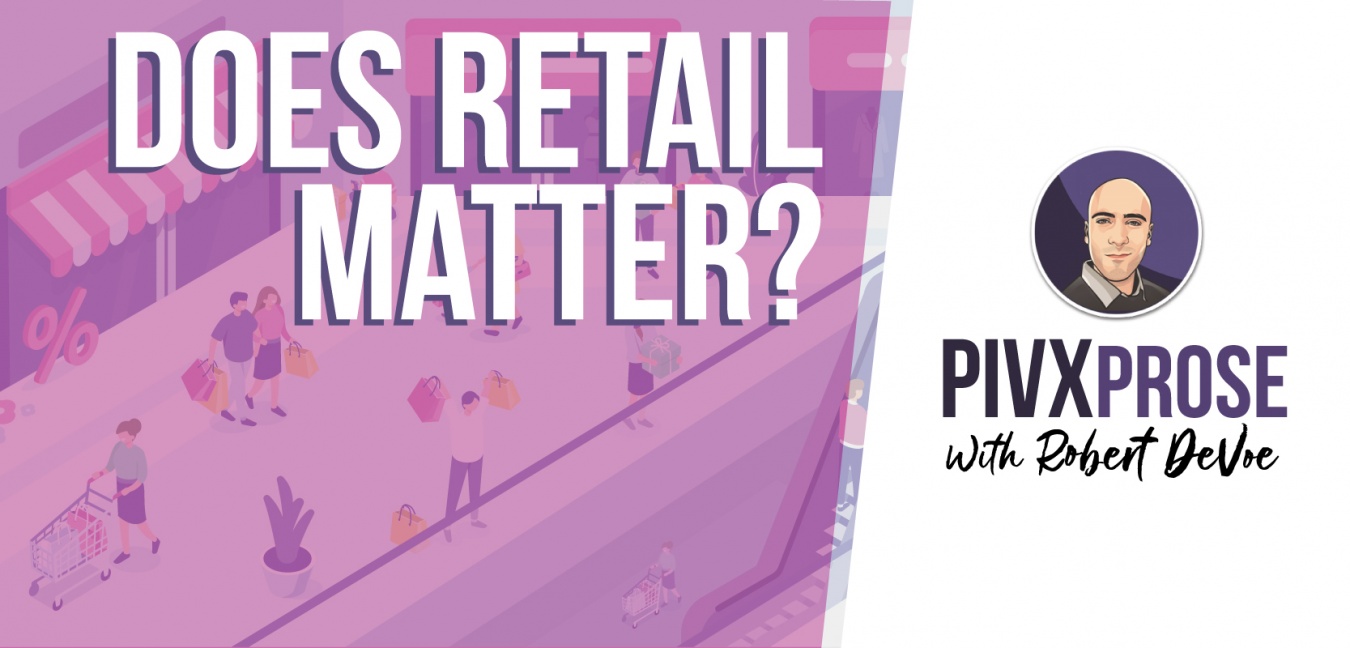Will it be one of the defining characteristics of which coin or token gets adopted first? To answer this question we need to consider a few different factors. Join me as I go over this interesting topic and figure out whether or not retail adoption matters.
The case against retail
Let’s suppose for a moment that you go to your favorite store. On the counter, you notice an unfamiliar-looking payment terminal with a few logo stickers on it that you don’t recognize. As you have been going to the store for years, you likely have a payment routine that you are already used to. As such, you are likely already reaching for your wallet or your mobile device to make your payment. If you are like any normal person, most likely you will ignore that unfamiliar looking terminal as either; you don’t know what it is, you assume that it’s for other people, or you consider it irrelevant to you.
Let’s assume further that you are a typical person and know little to nothing about cryptocurrency. Even if someone were to tell you that the payment terminal is for “cryptocurrency”, these words may likely be little more than gibberish to you. If you are over a certain age, you might just assume that it’s some trend for teens and nothing to concern yourself with.
Let’s look at it this way. The simple fact is that people have been buying and selling things for millennia without the need for cryptocurrency. If this is merely an alternative payment method, then that in and of itself is not particularly notable.
In this way, having a terminal that is able to accept cryptocurrency may not necessarily be game changing or may not lead to adoption. People need a reason to change up their lifestyles – especially if that includes learning the ins and outs of something as complicated as cryptocurrency, exchanges, wallets, altcoins, and so on. A payment terminal or a QR code just isn’t enough.
The case for retail
Even though a huge portion of consumer commerce has moved onto the Internet, there are still countless examples of transactions we make in physical stores and that, at least for now, cannot be replicated online. The favorite example of choice for cryptocurrency commentators, the coffee shop, is still apt.
When we go into our regular coffee shop, anything in there that is different potentially stands a chance of arousing our interest or making us aware of something that otherwise may have escaped us.
Consider this as an example. You go to your favorite restaurant and notice a signboard that says they are offering a new special that you were previously unaware of. With something as simple as just a signboard, you are now aware of something that you weren’t before.
It is possible to assume that having a physical presence in a location that people want to go to could lead to increased awareness of a technology, which could then later lead to some early adopters catching on.
The case for crypto in retail becomes very interesting, however, when we start to consider what would happen if businesses actively encourage customers to use it through incentives.
Today, more and more businesses are refusing to accept payments through visa. This is because the fees charged by Visa are beginning to cause serious problems and are threatening the profitability of some businesses. While this fee is invisible to the consumer, any transaction made with a Visa card comes with a hefty fee attached that must be paid by the business. For example, it is becoming increasingly common to see businesses charging a credit card fee (sometimes a “convenience fee”) to its customers as a way of mitigating this cost and not charging customers that pay in cash a higher price.
But cash handling is not free, either. Businesses that handle cash need to operate a professional-grade safe, and often rely on an armored car service to collect the contents of the safe regularly. Taking payments in cash can also slow transactions down, which could lead to increased wait times at various types of businesses.
Now let’s talk about incentives. Let’s suppose that a major retail chain that accepts cryptocurrency payments were to offer a discount for using it. Let’s say, for example, a percentage-based discount or a flat discount like $0.25 off each transaction. Let’s also assume that these businesses have set up rapid pay terminals that can connect to a mobile device wirelessly with a thumbprint much in the way Apple and Google Pay operate. Transactions would be speedy, and would come with practically zero cost to the business. While the incentives a business could make would likely be small, it could be enough of a benefit to encourage more people to dip their toes in cryptocurrency, which would inevitably lead to greater adoption.
Retail might not matter at all
One final possibility I would like to consider is if retail is largely irrelevant as far as adoption occurs. According to some experts, cryptocurrencies could eventually become almost entirely the domain of government and institutional bodies that want to move capital around the world instantly and without restriction.
For example, let’s say that a multinational conglomerate is doing business in several different countries and thus is working with several different currency types. If they want to move funds around the world, they need to rely on Forex systems that charge hefty fees, and international banking systems the charge yet more fees. Instead, imagine if this hypothetical company could simply use the cryptocurrency of their choice to instantly move hundreds of millions of dollars anywhere around the world and converted into any national currency in the blink of an eye with fees that are borderline nonexistent. It’s possible that businesses are already doing this today but are not announcing it.
According to Coinbase custody, the company is regularly stockpiling away hundreds of millions of dollars in cryptocurrency in the names of these types of major institutional and government sized bodies. This is real, and it’s already happening.
If there are hundreds of millions or even billions of dollars whizzing around the globe via cryptocurrency, this could represent far more financial activity thaen just your typical John Q public buying a pack of razor blades at the local drugstore. And that doesn’t even begin to touch on the potential for offshore financial storage such as what is traditionally kept in places like the Cayman Islands.
Privacy cryptocurrencies like PIVX could prove to be the ultimate means of storing incalculably large stockpiles of cash off the radar and out of sight.
Summing it all up
My point in discussing this today is that retail may or may not be the ultimate linchpin that decides the future of cryptocurrency. I would argue that at most, it’s more of a publicity stunt than anything else. The real value of cryptocurrency will likely be found in moving massive amounts of money around the world in the blink of an eye – something that will inevitably come as the world becomes more interconnected and the need for non-governmental currencies that are accepted around the world grows.






